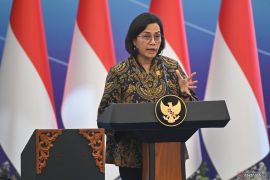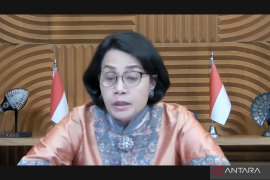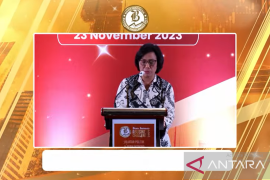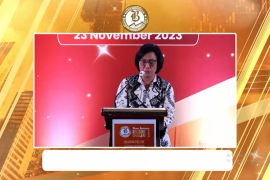This must be anticipated bearing in mind that, as per the latest data, the uncertainty risk due to COVID-19 is still relatively high.Jakarta (ANTARA) - The Indonesian government has forecast that in 2021, tax receipts will grow at a moderate pace of 5.5 percent of the 2021 target set in presidential regulation number 72 of 2020. "This must be anticipated bearing in mind that, as per the latest data, the uncertainty risk due to COVID-19 is still relatively high," Finance Minister Sri Mulyani Indrawati said during a plenary meeting with the House of Representatives (DPR) here on Tuesday.
She said the outlook for realized tax receipts will likely be lower than the target for 2020, thereby the tax ratio will be lower than expected.
To that end, the expansion of the tax receipt base will be key to the successful optimization of tax receipts in 2021 and beyond, she remarked.
"This can be realized if the ongoing tax reforms, both policy and administrative reforms, continue to be strengthened and accelerated," she noted.
“The tax reform program should translate into improvement in the five main pillars -- tax regulation, organization, human resources, information technology, and database and business process,” she pointed out.
Various reforms have shown significant results, including organizational modernization, easy services for taxpayers through e-filing, e-registration, and the click-call-counter program, she said.
The other measures include the conduct of supervision and law enforcement in a more structured and just manner through the implementation of compliance risk management, and the improvement of information and communication technology's reliability by improving the quality of internal and external data.
Apart from that, the latest achievement in terms of tax reforms is the implementation of Taxpayer Accounting modul Revenue Accounting System (RAS) by the Directorate General of Taxation in July, 2020, she pointed out.
In the area of policies, the government has made several breakthroughs, including provision of tax amnesty, abolition of administrative sanctions through reinventing policy, asset revaluation, and an increase in untaxed income, she added.
The other areas are the application of a 0.5-percent tariff on final income tax of micro, small, and medium businesses, the reduction of corporate income tax tariff, and other incentives aimed at tackling the COVID-19 pandemic, she noted. (INE)
Related news: Minister outlines key steps for locking in growth in 2021
Related news: Finance minister stresses on hard work to attain zero-percent growth
EDITED BY INE
Translator: Astrid Faidlatul H/Suharto
Editor: Fardah Assegaf
Copyright © ANTARA 2020












